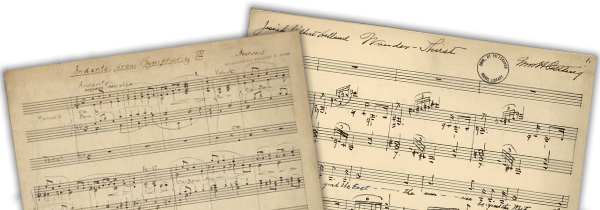Collection provides a valuable record of Stephen Foster's composition process, nineteenth century life in the United States, the music business, Pittsburgh history, and Foster's legacy.
Pages
-

-
History of the Dutton children
-
Gentle Annie -- Darling Nelly Gray -- Nancy Till -- Rosalie, the prairie flower -- Old cabin home -- The Hazel dell -- Willie, we have missed you -- The mountain maid's invitation -- O come, come away -- Wait for the wagon -- What is home without a mother!, Includes words of songs by Jenietta and Betsy Maria Dutton., Cover title., Narrative history of children on cover.
-

-
Hold the fort
-
Without music., Type ornament border., "The words and music of this song will be sent to any address, post-paid, on receipt of 40 cents, by H.J. Wehman, P.O. Box 1823, New York City. Catalogue of songs, books, novelties, &c., sent free.", First line of text: Ho! my comrades, see the signal waving in the sky., First line of chorus: Hold the fort for I am coming., Publisher's no.: 73
-

-
Holiday schottisch
-
composed by S.C. Foster., For piano., Library copy imperfect: photo pasted over imprint on t.p., Advertisements in botttom margins of p. 2-4., Foster Hall Collection cutter no.: FS75.538., [Musical bouquet].
-

-
Holloway's musical monthly
-
words by Clara Morton ; music composed expressly for Holloway's musical monthly by the late Stephen C. Foster., The music, in the Key of G, is a vocal solo with piano accompaniment., "Geo. F. Swain.", Price mark 3 in six-pointed star., First line of text: All day long I've mourn'd thine absence., The copyright deposit in the Library of Congress is dated March 10, 1864. However, it does not bear the original magazine pagination which appears on this copy. The copies with the magazine pagination are considered earlier editions than the copyright deposit., On the second music page, third bracket, first measure of melody, the fourth note is "D". In later editions this note is changed to "A", although the original slur between the third and fourth notes is still faintly visible., In Holloway's musical monthly (April 1864)., Music of Stephen C. Foster., Holloway's musical monthly (April 1864). OCLCN: (OCoLC)23535758
-

-
Honest working man
-
Without music., Publisher's no.: song 218., Foster, Stephen Collins, 1826-1864. Massa's in de cold ground., Massa's in the cold ground.
-

-
How are you green-backs?
-
Without music., Headpiece : Colored lithograph of a man dressed in top hat, red and white striped trousers and blue jacket, standing in a richly appointed room., Letter paper, blue ink., "Music of this song to be had of Wm. Pond & Co., 547 Broadway.", First line of text: We're coming Father Abraham, One hundred thousand more., First line of chorus: With our promise to pay : How are you Secretary Chase., Parody of the song "We are coming Father Abraham, three thousand more," for which several composers including Stephen Foster, wrote sets of music.
-

-
How are you green-backs?
-
Without music., Charles Magnus is listed at 12 Frankfort St. in New York City directories for 1861 through 1867. Wm. A. Pond & Co. was at 547 Broadway from 1863 until 1877., Colored lithographed illustration: Printing press and portrait of Secretary of the Treasury Samuel P. Chase., Letter paper, blue ink., "Music of this song to be had of Wm. Ponds & Co., 547 Broadway.", First line of text: We're comming, Father Abram, One hundred thousand more., First line of chorus: With our promise to pay : How are you, Secretary Chase., Parody of the song "We are comming Father Abraham, three thousand more," for which several composers including Stephen Foster wrote sets of music.
-

-
How are you green-backs?
-
Without music., Colored lithographed illustration: Printing press and portrait of Secretary of the Treasury Samuel P. Chase., Press in headpiece is pink instead of gray., Letter paper, blue ink., "Music of this song to be had of Wm. Ponds & Co., 547 Broadway.", First line of text: We're comming, Father Abram, One hundred thousand more., First line of chorus: With our promise to pay : How are you, Secretary Chase., Parody of the song "We are comming Father Abraham, three thousand more," for which several composers including Stephen Foster wrote sets of music.
Pages
